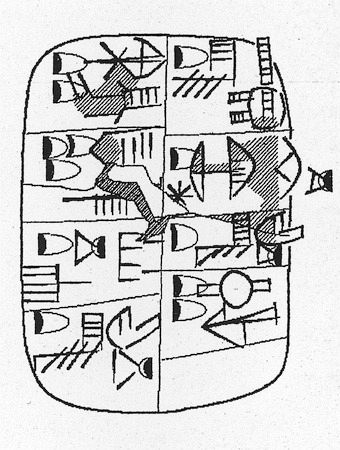
Archaische Verwaltungstexte aus Uruk Vorderasiatisches Museum II
Mit einem Beitrag von Rainer M. Boehmer
Versandkostenfrei!
Versandfertig in 3-5 Tagen
52,00 €
inkl. MwSt.

PAYBACK Punkte
0 °P sammeln!
Im vorliegenden Band werden die Archaischen Tontafeln in Kopie und Umschrift veröffentlicht, die in den Jahren 1933 bis 1939 in der alten Stadt Uruk im heutigen Südirak gefunden wurden und im Vorderasiatischen Museum in Berlin aufbewahrt werden. Sie sind Zeugnisse der ältesten Schrift, die wir kennen; sie stammen aus den letzten Jahrhunderten des 4. vorchristlichen Jahrtausends. Es handelt sich um Aufzeichnungen aus dem Bereich einer zentralen Wirtschaftsverwaltung, deren Aufgabe es war, große Mengen von Lebensmitteln, aber auch von Rohstoffen und Fertigprodukten vorrätig zu halten, ihre ...
Im vorliegenden Band werden die Archaischen Tontafeln in Kopie und Umschrift veröffentlicht, die in den Jahren 1933 bis 1939 in der alten Stadt Uruk im heutigen Südirak gefunden wurden und im Vorderasiatischen Museum in Berlin aufbewahrt werden. Sie sind Zeugnisse der ältesten Schrift, die wir kennen; sie stammen aus den letzten Jahrhunderten des 4. vorchristlichen Jahrtausends. Es handelt sich um Aufzeichnungen aus dem Bereich einer zentralen Wirtschaftsverwaltung, deren Aufgabe es war, große Mengen von Lebensmitteln, aber auch von Rohstoffen und Fertigprodukten vorrätig zu halten, ihre Einnahme zu verbuchen und sie an Berechtigte zu verteilen. Wir erfahren so zwar nichts über historische, religiöse oder allgemein geisteswissenschaftlich relevante Themen, aber wir gewinnen doch Einsichten in einen wichtigen Bereich der komplexen städtischen Gesellschaft Babyloniens im ausgehenden 4. vorchristlichen Jahrtausend. Mit diesem sechsten Band ist die Veröffentlichung der in Deutschland aufbewahrten Archaischen Texte abgeschlossen. Die Reihe umfasst insgesamt sieben Bände.
This is the first publication of the archaic clay tablets, all shown in original as well as a transcription, which were discovered between 1933 and 1939 in the old town of Uruk in southern Iraq and are kept in the Museum of the Near East in Berlin. They are remains of the earliest known form of writing, dating back to the last decades of the 4th millennium BC. The texts document a central economic administration responsible for managing large amounts of food as well as raw materials and finished products, keeping account of entries and the correct redistribution. While telling us nothing about historic, religious or general themes, these texts give us an insight into an important sector of a complex urban society in Babylonia in the late 4th millennium BC. The 6th volume of this series completes the publication of archaic texts kept in Germany.
This is the first publication of the archaic clay tablets, all shown in original as well as a transcription, which were discovered between 1933 and 1939 in the old town of Uruk in southern Iraq and are kept in the Museum of the Near East in Berlin. They are remains of the earliest known form of writing, dating back to the last decades of the 4th millennium BC. The texts document a central economic administration responsible for managing large amounts of food as well as raw materials and finished products, keeping account of entries and the correct redistribution. While telling us nothing about historic, religious or general themes, these texts give us an insight into an important sector of a complex urban society in Babylonia in the late 4th millennium BC. The 6th volume of this series completes the publication of archaic texts kept in Germany.
Dieser Artikel kann nur an eine deutsche Lieferadresse ausgeliefert werden.


